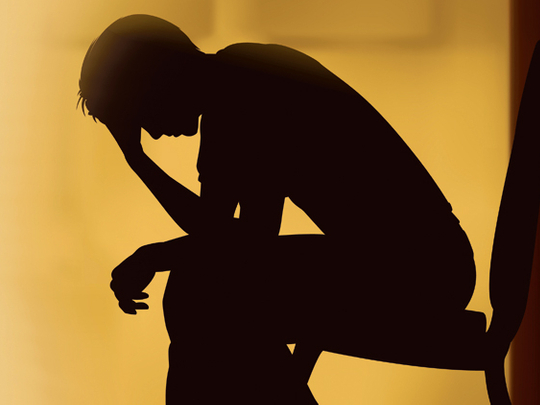
Anne Rivers Siddons, the much celebrated author of 19 bestsellers, renders rather poetically what is now an increasingly pedestrian condition.
The haunting description in her book Outer Banks is attributed to the protagonist who lives in a world shadowed by her father's suicide, among other secrets. "There is a fraternity of us, the abyss walkers," Siddons writes. "In our eyes, the world is divided by it — those who walk frail, careening rope bridges over the abysses, and those who do not. The other half of the world, the solid, golden half, the non-abyssers… they feel nothing under their feet but solidity. They inherit the earth. We inherit the wind."
Siddon's words describe a much touted but probably true cliché: people who have experienced depression know it well, but people who have not, will never do. She also provides an accurate description of living with the condition, and the appropriately abysmal fear of it. It could be a young parent still in recovery; a boy or girl who has just come out of it; a grandparent who recalls several past episodes; or just about anyone's friend, family member, colleague or neighbour who has battled depression before. These people live their lives like rope-walkers do, careful in their tread, cautious in their approach, ridden with worry that they may slip into the dark, deep, bottomless pit — the one they have been in before — at any time.
The strength and scale vary based on situation — from niggling doubt to full-blown panic attack, and in the worst case, phobias — but fear of depression is almost as commonplace as depression itself.
Most adults and many teenagers experience short periods of feeling sad, low, unhappy or miserable during the course of their lives. But when depression sets in, this is accompanied by anxiety, guilt, irritability, emptiness, hopelessness, helplessness, worthlessness, restlessness, and the inability to do most normal things over long stretches of time.
"Depression is all about ‘less-ness'. You are less than what you used to be, what you can be, and what you should be," says EJ, a 41-year-old Indian resident of Dubai who was diagnosed with the condition last year, and has just concluded nine months of psychotherapy.
EJ looks back on this period as one with no balance between thought and reality.
BT, a 48-year-old Frenchman, says that depression is about being off balance. "I was in therapy for almost three years, and for the first two years, I was nothing more than a nutcase. I didn't know who I really was, what I was thinking, what I wanted to do. I spent entire days in my bedroom with the blinds drawn tight, doing only what was absolutely necessary, until I made necessary changes to my life with the help of my therapist, and brought it back on track." >
EJ's psychologist, Dr Andrea Tosatto, says in many cases depression is nothing but impotent anger about an issue, or various issues. "A depressed person tends to focus, even obsess, that there is no way out of his/her situation, instead of addressing the issue that causes the situation. He or she cannot, or simply doesn't want to see a way out of it. Often, depression can be summarised as the direct result of non-action."
Road to recovery
While both BT and EJ agree psychotherapy helped them get over their darkest days and reiterate that they are not currently classified as being depressed, they share a great fear that ‘it' will return. EJ says she felt like she was hit in the solar plexus the first time she felt low after her counselling stopped. "Depression is an empty, blank, hollow state of being where I did not actually feel any emotion. Fearing it, on the other hand, engulfed me with a conscious, tangible and burning hot feeling. I was petrified I could regress back into a condition I had just come out of," she says. When she called Dr Tosatto to find out why she felt such a morbid fear, he told her it could be a normal step of her recovery.
Dr Tosatto, a consulting clinical psychologist at Synergy Integrated Medical Centre in Dubai, says it is actually healthy to nurse this fear: when there is danger involved, it is good to be scared about some things in life.
Remember the old adage that a burnt child dreads the fire? He says, "The more you remember the past with fear, the lower the possibility that you will go back there. If you remember the sensation, you will not want it again, and wanting to avoid it is healthy behaviour. This must be boosted with taking steps that move you further away from the fear."
As a certified psychologist and hypnotherapist, Dr Tosatto draws from his broad spectrum of experience as he describes the recovery process.
"Depression does not happen overnight, and its cure does not happen magically. It is not like a cold where you pop a pill, drink some soup, allow your body to rest, and wake up feeling fine.
"Counselling involves active and mutual participation by both the patient and the professional. But above all, it involves understanding and practising new behaviour."
During and after counselling, depressed patients emote and exhibit various feelings, but fear is almost never one of them, unless the symptoms include phobias. Does he, or other mental health professionals, have to advise patients to cultivate this fear as a sign of recovering mental health?
"I don't have to tell anyone, or even remind them, about their trauma. If the experience was deeply traumatic, they are certain to remember it," says Dr Tosatto.
New behaviour is slow to start, and sometimes, painful to practise. Also, changes are hardest when you have to make them yourself. EJ is glad she sought help when she felt depressed, and doubly glad that she asked for advice when she worried about its return. "Let's say it is like having an accident while foolishly attempting to cross Shaikh Zayed Road in the midst of heavy traffic. I have recovered. I have even learnt to cross smaller roads, after looking left and right. But I certainly do not want to be lying in the middle of that highway, surrounded by speeding vehicles — ever again."
Compared to walking across Shaikh Zayed Road in oncoming traffic, and crossing an abyss over a rope, people recovering from depression often face great fears about the place they have emerged from. Dr Andrea Tosatto tells Iona Stanley that although the alarm may be bigger, it is better than the affliction. It could also signal recovery.
***********
Crossing the abyss
Depression is a common psychological disorder, and ironically, it is the one that receives the least and the most attention.
An increasing number of people in the UAE — like in the rest of today's troubled world — don't realise they are depressed, while the number of those who know they are depressed but don't seek help is even larger. Seeking professional help for mental health disorders is traditionally associated with social stigma, and visiting a psychiatrist comes bundled with taboos, inhibitions, hesitation, shame, and even guilt. Concurrently, general practitioners here remain largely powerless as they are not allowed to prescribe antidepressant drugs that are commonplace elsewhere. An extraordinarily large number of depressed people also refuse to take medication for mental disorders, and often turn instead, to denial, self-help, religion, or ritualistic cults.
A seemingly apt solution is a visit to a psychologist. To quote EJ who has recovered from the condition, "There is no medicine or mantras involved here, only talk and tears. If you had an ailment, would you not see a doctor? So if your heart and head are feeling out of sorts, see a professional about it. Take the first step."











